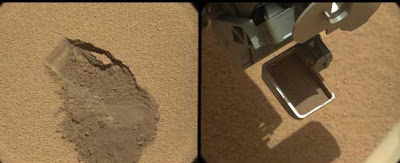John Grotzinger, project scientist for the Curiosity mission at Caltech, emphasized caution and patience during the team's announcement at the American Geophysical Union's Fall Meeting in San Fransisco today.
"It has made this detection of organic compounds, simple organic compounds," said Grotzinger, referring to the mission's Sample Analysis at Mars (SAM) instrument.
Importantly, he added, "We simply don't know if they're indigenous to Mars or not."
If confirmed, organic compounds on Mars could indicate a more life-friendly environment than previously thought. Grotzinger cautioned, however, that there are a slew of tests needed before scientists can even entertain the idea of life on Mars.
First, scientists have to confirm that the compounds originated on Mars and not Earth. Next, they have to determine whether or not these compounds are part of the "background fall of cosmic materials," that fall onto every terrestrial planet, he said.
Only after dissecting these two questions can scientists start to examine whether certain compounds are biological or not. In other words, there's plenty of work ahead.
Over-Hyped or Just Right?
A few weeks ago, Grotzinger caused a stir when he told an NPR reporter[*8] that the data presented today would be "for the history books." Speculation abounded, forcing NASA to officially backtrack a few days ago. They sent out a press release to lower expectations and asked everybody to "chill" on the official Facebook page.
Quite a few internet commenters have expressed anger and disappointement, and many feel that Grotzinger deceived them with his earlier comment. Although Grotzinger's statement was a little hyperbolic, I think the whole episode was an important insight into how science works.
Discoveries require corroboration — and that takes time. Increasingly, people expect to have all the answers immediately, but science can rarely guarantee instant gratification.
Perhaps this is partly because science is presented as a series of breakthroughs in the media. This archetype works well in a fast-paced news environment, but it's not the most accurate portrayal of how results become established science.
Nonetheless, Curiosity will continue its mission, moving across varied terrain that should reveal more about Mars and its past. In time, we may just find something unexpected.
"Curiosity's middle name is patience," said Grotzinger. "And we all have to have a healthy dose of that."
Video streaming by Ustream[*9]
.
JPL's press release for today can be found here[*10] .
~


